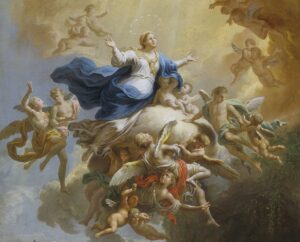Solemnity of Mary Assumed into Heaven
Massimo Palombella

The origins of the feast of the Assumption are to be found in the East, in the middle of the 6th century, as reflected in the narrative of pilgrims who visited Jerusalem at that time. Towards the end of the 7th century, Emperor Maurice extended the feast to all regions of the Empire, fixing it at 15 August.
The Dogma, the truth of faith, about the Assumption of Mary into heaven was proclaimed by Pope Pius XII on 1 November 1950 with the Apostolic Constitution ‘Munificentissimus Deus’. This dogma is the last one historically defined in the Church.
Mary Assumed into heaven points us to a precise goal, a certain point of arrival of our every human act.
Our history, joys, sorrows, love, passion, fatigue, successes, failures, our tears… Nothing will be lost, but everything will be transformed, transfigured into meaning, into “life in abundance”, into fullness of humanity.
We will see God face to face, and that alone will be the fulfilment of everything, that which will give meaning to every fragment of our lives.
The Communion antiphon for today’s celebration is taken from the first chapter of Luke’s Gospel (Lk 1:48, 49) with the following text:
“Beatam me dicent omnes generationes,
quia fecit mihi magna qui potens est.”
(All generations shall call me blessed;
for he who is mighty has accomplished great things on my behalf).
The attached music, in Gregorian Chant, is taken from the Graduale Triplex published in Solesmes in 1979. The interpretation is by the Choralschola der Wiener Hofburgkapelle conducted by Hubert Dopf. The music track can be found on the CD “Gregorian Chant for the Church Year” published by Universal International Music B.V. in 1997.
A blessed Solemnity and heartfelt greetings.
